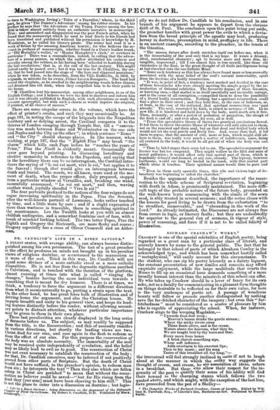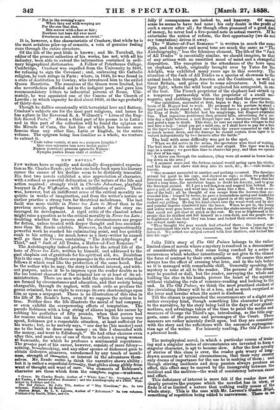RICHARD CRASHAW'S WORKS. * CRASHAW is one of the special celebrities
of English poetry, being regarded as a great man by a particular class of literati, and scarcely known by name to the general public. The fact that he belonged to that school of poets of which Abraham Cowley is the acknowledged type, and which has been somewhat hastily called "metaphysical," will easily account for this circumstance. To the student, who can sip his poetry leisurely as a dainty liqueur, the constant presentation of new similes and conceits may afford exquisite enjoyment, while the large multitude that courts the Muses to fill up an occasional hour demands something of a more broadly human interest than the minstrels of this school can offer. He who takes up Crashaw should be a lover of fancy for its own sake, not as a faculty for communicating in a pleasant form thoughts on things desirable to be reflected on for their own value, for here is the very arabesque of poetic art. A passage of wondrous beauty will follow or precede another distinguished by nothing save the far-fetched character of the imagery ; but even this " far- fetchedness " must be considered as a source of pleasure by him who is capable of appreciating the school. When, for instance, Crashaw sings to the weeping Magdalen,— ' Upwards thou dost weep ;
Heaven's bosom drinks the gentle stream ; Where the milky rivers creep Thine fiesta above, and is the cream. Waters above the heavens, what they be, We are taught best by thy tears and thee. Every morn from hence A brisk cherub something sips, Whose soft influence
Adds sweetness to his sweetest lips ; Then to his music ; and his song Tastes of this breakfast all day long,"—
the irreverend will feel strongly inclined to oadle if not to laugh aloud at the manner in which the -dilkY way suggests the thought of cream, and cream, by the association of ideas, ushers
in a breakfast. But those Who allow their respect for the in- genuity of the poet to qualify their sense of his oddity will find their reward in the charming stanza which follows the two quoted above and which might, with the exception of the last line, have proceeded from the pen of a Shelley- * The Oompkte Works of Richard Crashaw„ Canon of Loretto. Edited by Wil- liam B. Turnbull, Esq., of Lincoln's Inn, Barrister-at-law. Published by Russell Smith.
"Not in the evening's eyes When they red with weeping are For the sun that dies,
Sits sorrow with a faoe so fair ;
Nowhere but here did ever meet Sweetness so sad, sadness so sweet."
It is, however, a fine characteristic of Crashaw, that while he is the most sedulous piler-up of conoeits, a vein of genuine feeling runs through the entire structure. Of the life of the poet little is known; and Mr. Turnbull, the editor of the present collection of his works, has not, with all his industry, been able to extend the information contained in ordi- nary biographical dictionaries. A Fellow of Peterhouse College, Cambridge, Crashaw was expelled from the University in 1644, -for refusing to sign the Covenant; and, embracing the Catholic religion, he took refuge in Paris; where, in 1646, he was found in a state of destitution by Cowley, who introduced him to the exiled Queen Henrietta. The resources of the Queen were limited, but she nevertheless afforded aid to the indigent poet, and gave him recommendatory letters to influential persons at Rome. Ulti- mately, he was appointed one of the Canons of the Church of Loretto ; in which capacity he died about 1650, at the age probably of thirty-four. Though he dallies occasionally with terrestrial love and flattery, Crashaw's subjects are for the most part religious, and hence he has a place in the Reverend R. A. Willmott's "Lives of the Eng- lish Sacred Poets." About a third part of his poems is in Latin ; and in this part of the collection will be found the epigram on the Miracle of Cana, the last line of which has become more famous than any other line, Latin or English, in the entire volume. The epigram being less familiar as a whole, we venture to extract it.
"Untie rubor vestris, et non sua purpura lymphis ? Qum rose mirantes tam nova mutat aquas ? Rumen (eonvivie) pramens agnoseite Numen : Nymphs pudica Deem vicht et ernbuit."



























 Previous page
Previous page